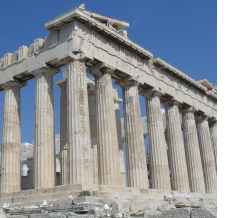Greek
It’s All Greek To Me! The Origins of Modern Words in Entertainment & Magic
I am sure, like me, many of you will be familiar with this expression without knowing the real significance. It was only on a Classic Greece holiday that I found out just how many words we use every day in the English language actually have Greek origins.
Here are a few examples.
- Antiqua – antique, antiquity, ancient.
- Biblos – book, bible.
- Cosmos – (world) cosmopolitan.
- Dynamis – (power) dynamite, dynasty.
The list goes on, so what has all this to do with magic you are surely already asking. Well now having an interest in the subject I started to look up words relating to our art and found some interesting results.
 The first word that came to mind was morph(e) meaning shape or transforming bringing about metamorphosis – the substitution trunk.
The first word that came to mind was morph(e) meaning shape or transforming bringing about metamorphosis – the substitution trunk.
Scopos means watcher and leads to horoscope cinemascope etc (oops! etc that’s Latin).
Pyr or pyro means fire, hence pyrotechnics.
In Greek mythology the name Luna is sometimes used as a nickname for any goddess associated with the moon. Remember the Luna Trick – children’s effect a la die box.
I could go on but I feel our website will not have space for more than a page so I’ll finish with a few words from the entertainment world generally.
Cine means motion so we have cinema. The theatre name of Adelphi comes from Adelphoi meaning brothers. Presumably this refers to the brotherhood of actors appearing on the stage. Theatron (theatre) was a place where the audience of a Greek tragedy sat to watch the performance. Finally choreography appears to derive from khorus (chorus) and/or khoreia (dancing in unison). There you have it then, now it’s all Greek to you too!
Geoff Newton
Webmaster Note: I couldn’t leave this post without adding a favourite of mine – Hippodrome, from the Greek word Hippos – for Horse (and not Hippopotamus, which means “water horse”). Originally a Hippodrome was an ancient Grecian stadium for horse racing and chariot racing. The word was resurrected in Victorian and Edwardian times for buildings constructed specifically for animal & variety acts (such as the World Famous London Hippodrome, and more locally The Rochdale Hippodrome), which often became theatres in later years. Thank goodness they never raced hippopotamuses / hippopotami!
The modern word circus, now associated with entertainments such as clowns, jugglers, acrobats and magicians, originates from Roman horse racing tracks (circuits) which were very similar to Hippodromes. But as that is a Latin origin, and not Greek, it might be best to leave that for another post!